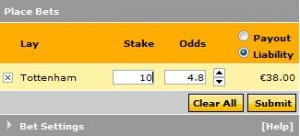The rapid growth of online betting has sparked yet another gambling revolution with the introduction of the sports betting exchanges. If you are a sports fan and have placed a bet at any time in recent years, you have probably heard about betting exchanges like Betfair or WBX.com. Many people are aware of them but do not fully understand how they work, preferring instead to stick to the familiar platform of their favorite bookmaker’s website.
So what is a betting exchange and how does it differ from a traditional betting website? By answering these questions, you can decide whether betting exchanges are right for you. You may also learn a whole new way of betting and will be better placed to assess whether you are getting good value from your current bookmaker. But first, let’s remind ourselves exactly how the traditional bookmaker operates.
What is a traditional sportsbook?
A standard betting website is often referred to as a sportsbook and reflects the type of service offered by the traditional bookmakers. Depending on your global location, these bookmakers may also be referred to as betting agents or bookies but they all operate in the same way.
When you bet on a sports event in a sportsbook, the bookmaker sets the prices and you are essentially betting your money against theirs. You will back a particular outcome to occur at a price that reflects a certain probability determined by the bookmaker, and also allows for a small profit margin. If your prediction is correct, the bookmaker will pay you your winnings, if not you will lose your stake. This is the way that betting companies have operated for years but since the introduction of online betting, the amount of available markets has increased enormously.
What is a Betting Exchange?
At first glance, a Betting Exchange website may seem very similar to a standard Sportsbook website; with long lists of sporting events and a wide choice of betting options. However, the main difference on a betting exchange is that you have the option to “lay” a bet. This means that you are betting against a particular event occurring. In effect, you take the place of the bookmaker and risk your own money at a certain price.
The reason that this option exists is because there is no bookmaker on a betting exchange; just a large group of individual gamblers betting against each other. The betting exchange simply runs the software platform and takes a commission charge for handling the transactions. Having the ability to lay bets adds a completely different dimension to gambling as bettors can trade bets and react to changes in the market. By backing a bet when a price is high and laying a bet when the price is a low, a shrewd gambler can lock in guaranteed profits whatever the outcome of an event.
The image below shows an example of an exchange market on a football match taken from WBX with options to back or lay against the possible outcomes.
Laying a bet
Using the example above you can learn how to lay a bet. To begin, you must pick an outcome that you think has the least chance of occurring, once you have selected an outcome, you can set a price that you think is fair. The screen shot above shows the best prices currently matched. If your prediction is correct, you win the bet, if you are wrong you lose your liability.
Example of laying a bet
In this example, you decide that the match will be either a home win or a draw so you choose to lay Tottenham. You click on the bet and choose the matched odds or you can set a price that you think is far. If your price is unrealistic, the bet may not find a match.
-
Premier League: Liverpool v Tottenham
-
You lay Tottenham at 4.8 for a 10 unit stake
-
The bet is matched
-
If Tottenham win you will be liable to pay 38 units
-
If Liverpool win or the game is drawn, you win the stake of 10
Before you can place the bet, you need to ensure that there is enough money in your account to cover the liability. In effect, the bettor’s stake and your liability go into a pot and the winner takes it all.















